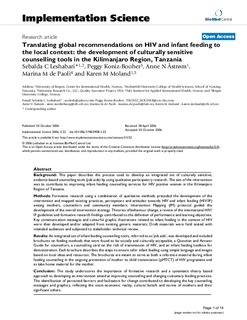| dc.description.abstract | Background: This paper describes the process used to develop an integrated set of culturally sensitive, evidence-based counselling tools (job aids) by using qualitative participatory research. The aim of the intervention was to contribute to improving infant feeding counselling services for HIV positive women in the Kilimanjaro Region of Tanzania. Methods: Formative research using a combination of qualitative methods preceded the development of the intervention and mapped existing practices, perceptions and attitudes towards HIV and infant feeding (HIV/IF) among mothers, counsellors and community members. Intervention Mapping (IM) protocol guided the development of the overall intervention strategy. Theories of behaviour change, a review of the international HIV/ IF guidelines and formative research findings contributed to the definition of performance and learning objectives. Key communication messages and colourful graphic illustrations related to infant feeding in the context of HIV were then developed and/or adapted from existing generic materials. Draft materials were field tested with intended audiences and subjected to stakeholder technical review. Results: An integrated set of infant feeding counselling tools, referred to as 'job aids', was developed and included brochures on feeding methods that were found to be socially and culturally acceptable, a Question and Answer Guide for counsellors, a counselling card on the risk of transmission of HIV, and an infant feeding toolbox for demonstration. Each brochure describes the steps to ensure safer infant feeding using simple language and images based on local ideas and resources. The brochures are meant to serve as both a reference material during infant feeding counselling in the ongoing prevention of mother to child transmission (pMTCT) of HIV programme and as take home material for the mother. Conclusion: The study underscores the importance of formative research and a systematic theory based approach to developing an intervention aimed at improving counselling and changing customary feeding practices. The identification of perceived barriers and facilitators for change contributed to developing the key counselling messages and graphics, reflecting the socio-economic reality, cultural beliefs and norms of mothers and their significant others. | en_US |
